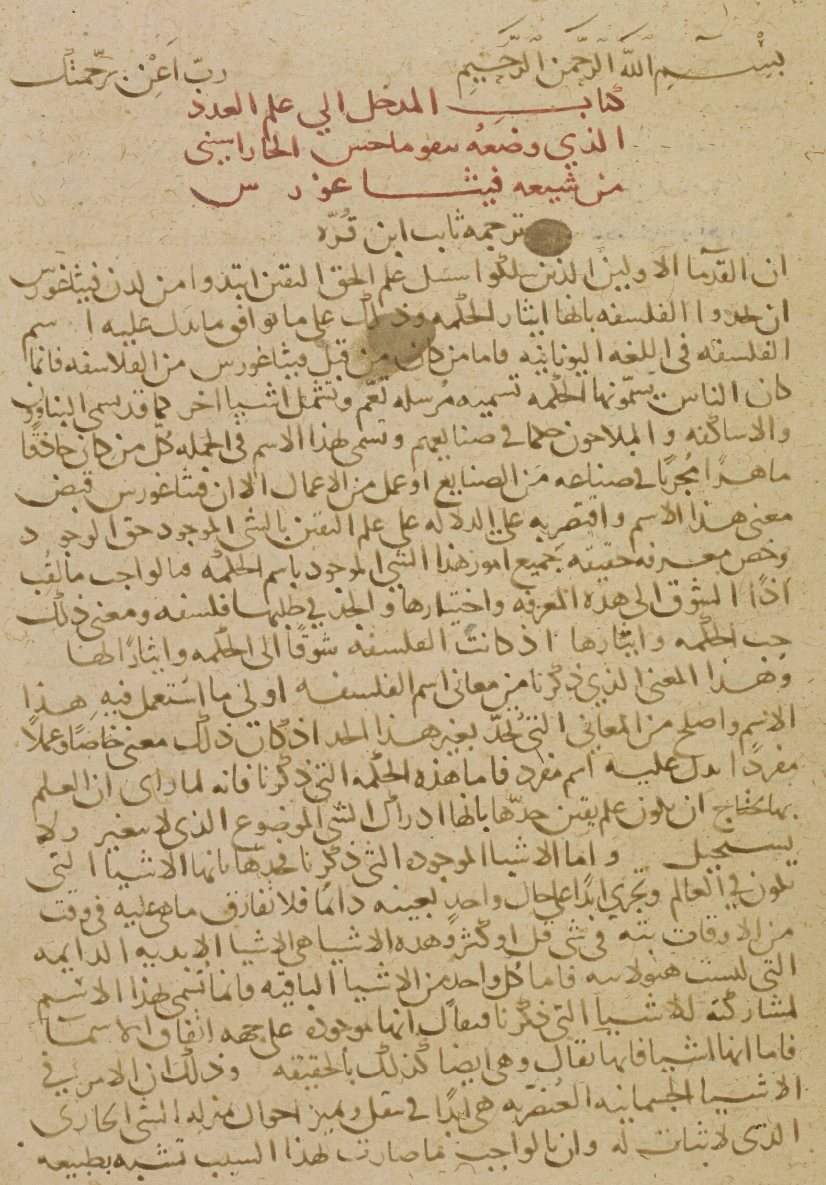Introduction to Arithmetic on:
[Wikipedia]
[Google]
[Amazon]
 The book ''Introduction to Arithmetic'' ( grc-gre, Ἀριθμητικὴ εἰσαγωγή, ''Arithmetike eisagoge'') is the only extant work on mathematics by Nicomachus (60–120 AD).
The book ''Introduction to Arithmetic'' ( grc-gre, Ἀριθμητικὴ εἰσαγωγή, ''Arithmetike eisagoge'') is the only extant work on mathematics by Nicomachus (60–120 AD).
"Introduction to Arithmetic"
translated by ''Martin Luther D'Ooge'' at archive.org. *
Nicomachus of Gerasa: Introduction to Arithmetic
' (1926) translated in English by Martin Luther D'Ooge with studies in Greek arithmetic by Frank Egleston Robbins and Louis Charles Karpinski at Haithi Trust Digital Library Mathematics books {{mathematics-lit-stub
Summary
The work contains both philosophical prose and basic mathematical ideas. Nicomachus refers toPlato
Plato ( ; grc-gre, Πλάτων ; 428/427 or 424/423 – 348/347 BC) was a Greek philosopher born in Athens during the Classical period in Ancient Greece. He founded the Platonist school of thought and the Academy, the first institution ...
quite often, and writes that philosophy can only be possible if one knows enough about mathematics. Nicomachus also describes how natural numbers and basic mathematical ideas are eternal and unchanging, and in an abstract realm. It consists of two books, twenty-three and twenty-nine chapters, respectively.
Although he was preceded by the Babylonians
Babylonia (; Akkadian: , ''māt Akkadī'') was an ancient Akkadian-speaking state and cultural area based in the city of Babylon in central-southern Mesopotamia (present-day Iraq and parts of Syria). It emerged as an Amorite-ruled state c. 1 ...
and the Chinese, Nicomachus provided one of the earliest Greco-Roman multiplication table
In mathematics, a multiplication table (sometimes, less formally, a times table) is a mathematical table used to define a multiplication operation for an algebraic system.
The decimal multiplication table was traditionally taught as an essenti ...
s, whereas the oldest extant Greek multiplication table is found on a wax tablet dated to the 1st century AD (now found in the British Museum
The British Museum is a public museum dedicated to human history, art and culture located in the Bloomsbury area of London. Its permanent collection of eight million works is among the largest and most comprehensive in existence. It docum ...
).
Influence
The ''Introduction to Arithmetic'' of Nicomachus was a standard textbook in Neoplatonic schools and become the basis of the Boethius' treatise titled '' De institutione musica''. The ''Arithmetic'' (in Latin: ''De Institutione Arithmetica'') of Boethius was aLatin
Latin (, or , ) is a classical language belonging to the Italic branch of the Indo-European languages. Latin was originally a dialect spoken in the lower Tiber area (then known as Latium) around present-day Rome, but through the power of the ...
paraphrase
A paraphrase () is a restatement of the meaning of a text or passage using other words. The term itself is derived via Latin ', . The act of paraphrasing is also called ''paraphrasis''.
History
Although paraphrases likely abounded in oral tra ...
and a partial translation of the ''Introduction to Arithmetic''.
The work of Boethius on arithmetic and music was exposed in the context of the ''Quadrivium
From the time of Plato through the Middle Ages, the ''quadrivium'' (plural: quadrivia) was a grouping of four subjects or arts—arithmetic, geometry, music, and astronomy—that formed a second curricular stage following preparatory work in the ...
'' liberal arts and had a great diffusion during the Middle Age.
Editions
* Nicomachus of Gerasa ''Introduction to arithmetic'', translated into English by Martin Luther D'Ooge; with studies in Greek arithmetic by Frank Egleston Robbins and Louis Charles Karpinski, University of Michigan studies (London: Macmillan, 1926). * Nicomachus of Gerasa ''Introduction to arithmetic'', translated into English by Martin Luther D'Ooge; with studies in Greek arithmetic by Frank Egleston Robbins and Louis Charles Karpinski (London: Johnson Reprint Corp., 1972).See also
*Superparticular ratio
In mathematics, a superparticular ratio, also called a superparticular number or epimoric ratio, is the ratio of two consecutive integer numbers.
More particularly, the ratio takes the form:
:\frac = 1 + \frac where is a positive integer.
Thu ...
References
Bibliography
; Archivistic sources *External links
* Nicomachus"Introduction to Arithmetic"
translated by ''Martin Luther D'Ooge'' at archive.org. *
Nicomachus of Gerasa: Introduction to Arithmetic
' (1926) translated in English by Martin Luther D'Ooge with studies in Greek arithmetic by Frank Egleston Robbins and Louis Charles Karpinski at Haithi Trust Digital Library Mathematics books {{mathematics-lit-stub